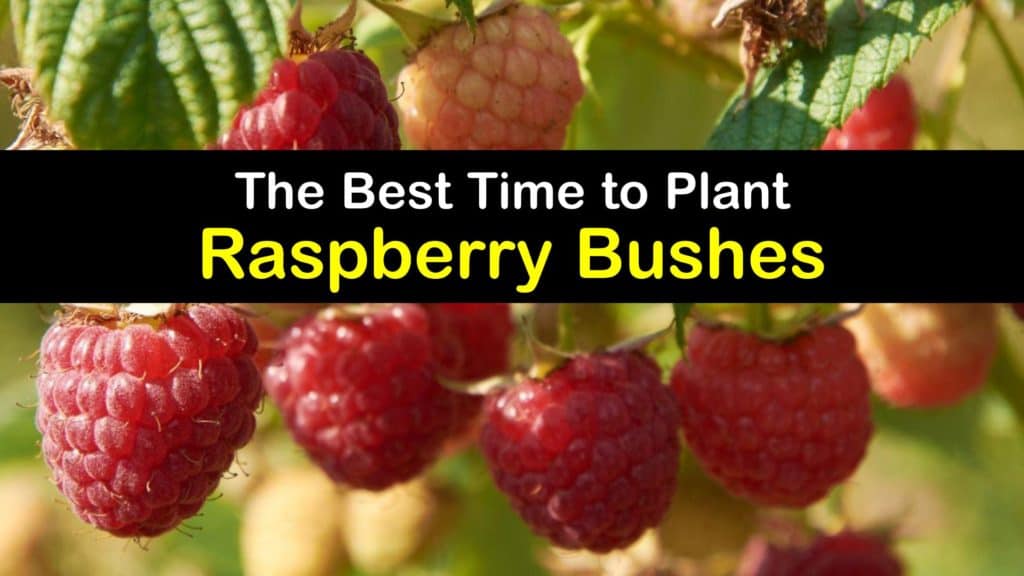Raspberries are a treat. They are delicious, succulent, and sweet; they make the perfect snack or dessert, though they may be tricky to grow without the proper knowledge. The question of when to plant raspberry bushes is critical. If you plant outside of the raspberries’ growing season, no matter how great your efforts, your raspberry canes will not produce well and may even fail.
Raspberries are a rewarding crop to grow, and as the prices of produce in grocery stores soar, it’s more critical than ever to grow fruit in your home garden, like when you plant raspberries. Most raspberry varieties occupy very little garden space compared to the amount of produce provided by fruiting canes.
This high yield makes them an excellent addition to the garden for most growers. They do well in raised beds, and despite their brambles, the berries are delicious when used fresh or freeze well to be saved for months in the late winter off-season when less fresh fruit is available.

When to Plant Raspberries for the Best Results
Raspberries are a cool-climate fruit suitable for most growers. Knowing the best time to plant raspberries is only one element of the crucial timing to ensure a productive harvest.
Raspberries do not continue to ripen when picked, so in addition to planting them at the right time and maintaining them, they must also be harvested at the right moment to ensure sweet, ripe berries. If you have questions about when to plant a raspberry bush, the following information will answer these and more.
Are black raspberries and blackberries the same thing and can you follow the same growing instructions for them? While they do look similar, they are different fruits and have slightly different care requirements.

When to Plant Raspberry Bushes in Your Home Garden
The very best time to plant raspberries or the ideal time to plant elderberries is in early fall to early spring, as this is their growing season. It is also the best time to plant cranberries, although their growing needs are much different. Most experts advise growers to start with year-old bare-root raspberry canes purchased from a local nursery.
If the ground is icy or soggy, wait until the soil is workable before planting raspberry seedlings. Store your new canes in a cool place and moisten them daily until the weather changes in your favor.
If you have to wait a while longer before planting your raspberry bushes, dig a hole in a well-drained, protected garden area and plant all the canes. Spread soil over the root system and around the stems and gently pat it down to allow some air circulation.
When it’s time to plant raspberries, you may wonder do raspberries need full sun? Yes, raspberry plants thrive in full sun in a sheltered location, but they also do well in partial shade, unlike many other fruits. This cool-climate plant prefers rich, moisture-retentive soil.
To help maintain and feed your new canes, add plenty of well-rotted, nutrient-rich organic matter like compost, either by digging it in or as mulch, and do this every year.
A trellis supports red raspberries, black raspberries, and purple raspberries, keeping the canes off ground level. When the plants are packed and bearing raspberries, this is crucial. Raspberry canes on a trellis produce easier-to-pick and cleaner fruits. Pruning summer-bearing raspberries is important in spring to promote branching.
When to Plant a Raspberry Bush by USDA Hardiness Zone
The USDA Plant Hardiness Zones are the gold standard for determining which plants are most likely to thrive in a given place and learning which plant species are compatible. If you have a specific question, like when to plant raspberries in zone 6, your local cooperative extension is an excellent source for information.
The cooperative extension will answer questions like when to plant raspberries in zone 7. They also help you choose the varieties of raspberries most suitable for your area and can direct you to purchase bare-root raspberry canes locally.
If you want to know when to plant raspberries in zone 5 specifically, reach out to your local cooperative extension for more resources and advice on anything from pollination to drip irrigation.
Raspberry Bush Fruit Cycles
The crowns and roots of raspberries are perennial, while the canes have a two-year life cycle. Primocanes grow in the first year of the process, and floricanes in the second year. The primocanes grow vegetatively, whereas the floricanes produce fruit and die back, allowing the cycle to begin again. This timing plays a role in how often your raspberry patch bears fruit.
When selecting your new plants, decide if you want summer-bearing, fall-bearing, or everbearing raspberry bushes. As the names suggest, summer-bearing varieties bear fruit in late summer, and fall-bearing produce a fall crop.
An everbearing species like the Fall Gold has increased hardiness against aphids and verticillium wilt and produces one crop of yellow fruit in early spring and another in late fall.
How to Plant a Raspberry Bush
Once you’ve established when to plant a raspberry bush, it’s time to prepare the soil by incorporating a large amount of organic material into the surrounding ground. Pour liquid fertilizer over the earth just before planting and work it in. Construct your trellis now or later.
To make this simple homemade fertilizer for raspberries, shake well, and leave the solution to sit for about 15 minutes, or until all the powder is dissolved. Spray this fertilizer on the soil before planting. To plant raspberry bushes, dig a trench ten inches deep and 12 inches wide. Spread out the root system of the raspberry canes in the channel and cover the roots with dirt.
Pat down the soil and give it plenty of water. Place individual raspberry canes approximately 20 inches apart. Cut raspberry canes to about eight inches after planting to stimulate robust growth from below ground.
Raspberries are easy to grow and have a lot of flavors, so you can’t go wrong if you plant a few canes. Whether you’re a newly started grower or an experienced gardener, if it’s raspberry growing season in your area, consider taking advantage of the best time to plant raspberries.
A raspberry patch bears high fruit yields for the amount of space it occupies in your home garden, and its berries are nutritious, tasty, and freeze well.

We hope you learned when to plant raspberry bushes and would appreciate it if you would share these tips on when to plant a raspberry bush with your family and friends on Facebook and Pinterest.